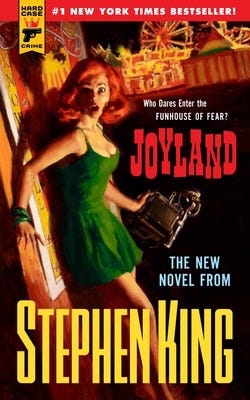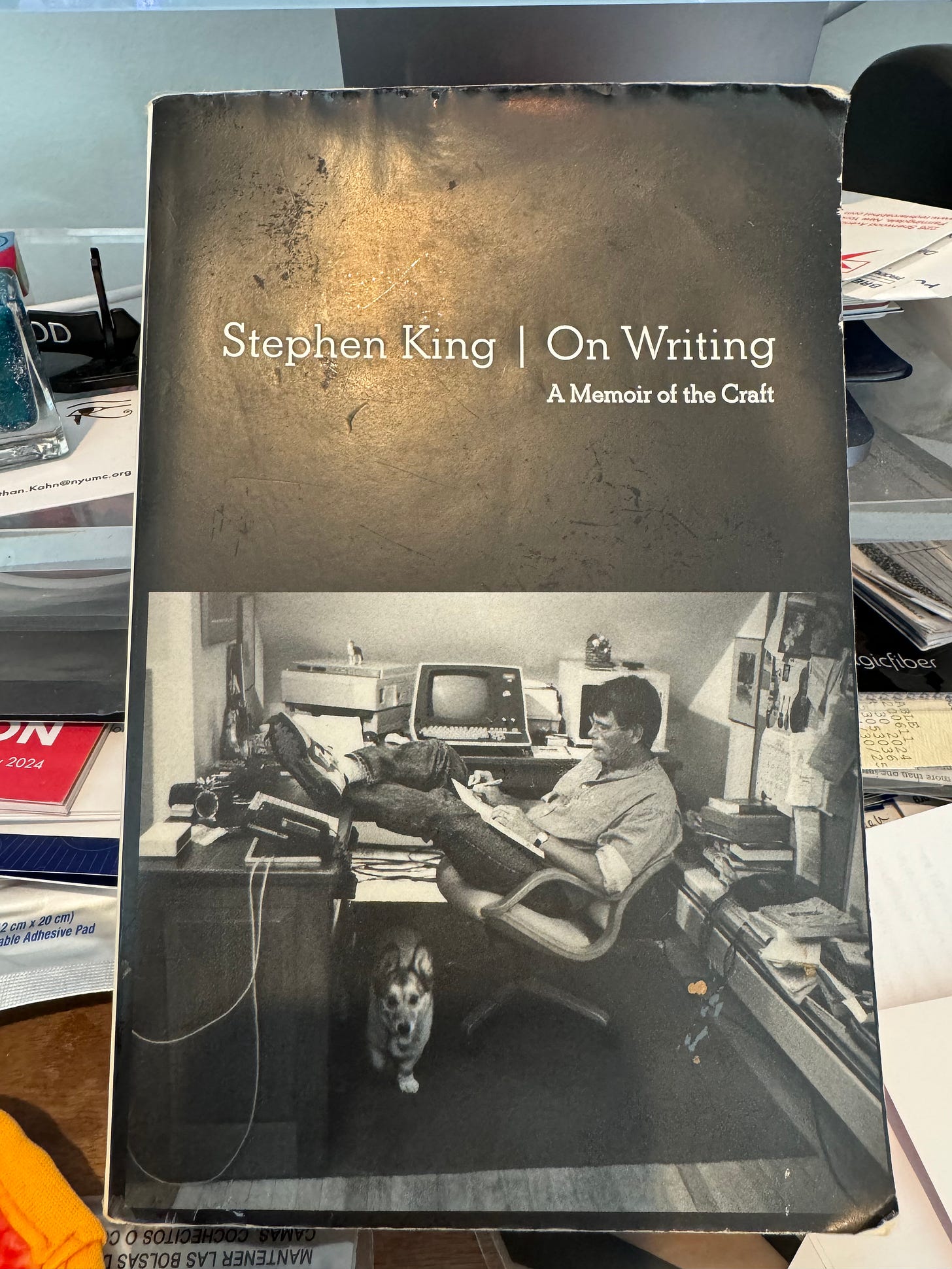How Stephen King Helped Me Out of Writer's Block
Picture me some time around sophomore year of college. I’m on the Upper West Side of Manhattan in a single in an old dorm with long, dark, creepy hallways, thin walls and beds with just enough room to hide under. At night, when I have to go to the bathroom, I find myself in a cavernous dingy room with a row of stalls and flickering, florescent bulbs. If someone were to come in, even if I pulled my feet up to hide, they’d see me through that huge space between the door and the frame.
This is when chicken-shit little me decided to read John Saul’s, “Suffer the Children.” I don’t think I slept for a month. Stumbling upon that cover still gives me PTSD.
I hate being scared and I’m very easy to spook. At “you-can-figure-out-how-old-I-Am-Based-On-The-Pub-Date-Of-Saul’s-Book” years old, sometimes, I’ll still wonder what’s under my bed. Blame it on my brother. When we were kids, it was him, hiding there, patiently waiting for me to be just about to fall asleep before poking a finger up between the springs supporting my thin mattress.
If you want to have a really good laugh, ask my daughter about the time I played FNAF on a airplane with the sound off. I spent the first half hour of the game screaming at jump scares and trying to figure out how to get out of that friggin’ room. She didn’t know whether to be mortified or die laughing.
As you can imagine, I did not read Stephen King novels. I assumed they were all horror and that none of it was for me. And then I read “On Writing.”
“On Writing” is Stephen King’s memoir/handbook on how to be a successful writer.
“If you want to be a writer, you must do two things above all others: read a lot and write a lot. There’s no way around these two things that I’m aware of, no shortcut.”
“On Writing” is a must-read for anyone who is writing or interested in the life of a successful author. King’s personal story of pursuing his dream and his advice to would-be authors is invaluable. Plus, it’s a great read.
One book that comes up often in his memoir and that particularly grabbed my attention was “Misery.” So I put on my big girl panties, went to the bookstore and picked up a copy. I proceeded to devour it and began working my way through many of the Stephen King classics including “Carrie,” “Salem’s Lot,” “The Shining,” and “Thinner.”
“I believe the road to hell is paved with adverbs, and I will shout it from the rooftops.”
I read books two ways. Sometimes I read for the sheer pleasure of it and sometimes I read as a writer. Usually, I’ll start by reading a book for the first purpose. Then, if something about the structure or the content makes it instructive enough for me to go back, I’ll reread and analyze as a writer.
“Misery” is a master class of a novel.
“Misery” (if you haven’t read it or seen the movie) is a psychological thriller about an author named Paul Sheldon who is held hostage by his “number-one fan,” Annie Wilkes, and forced to write a sequel in a series he abhors. There is so much more to this book (here is the 1987 Kirkus review), but here is why it was instructive to me as an author.
In “Misery,” King has stripped away all of the trapping that most authors needs to write a successful novel. Sheldon is locked away alone in a room with a shattered leg. He is drugged and spends most of the novel alone in bed or with his typewriter. His only interactions are with Annie, his fictional characters, and his memories. Other than a couple of terrifying attempts to escape that get him no further than Annie’s living room, Sheldon spends the novel confined to his room. Gone are the interactions with people and place that are usually used to progress a story.
“You cannot hope to sweep someone else away by the force of your writing until it has been done to you.”
“Misery” is instructive in many ways, but I have studied it mostly for its masterful close person third, limited POV perspective. In this novel, everything closes in—the four walls, Annie, Paul’s options. There is a ticking clock. King keeps ratcheting up the tension.
In DEINCEPTION, the sequel to REINCEPTION (forthcoming November 5, 2024), I painted one of my main characters, Ward, into a similar corner. Ward spends Book 1 as a strong character, physically and mentally. That entire novel, he is literally and figuratively running. Book two finds him incapacitated and surrounded by enemies. I found myself with a problem. Main characters need agency. How was I to give Ward agency from a position of helplessness and incapacitation. The answer was in “Misery.” Ward, like Paul, had to control his story. He had to find a way to use his impaired wits and his intellect to manipulate his outcome. Rather than just keeping this homage in my head, I put it on the page. Ward compares himself to Paul in Misery—a book which he found and read when hiding out in subway tunnels, fleeing from ReInception.
DEINCEPTION IS COMING SOON!
Thanks in part to Mr. King, DEINCEPTION is coming soon! Our cover reveal will be September 17 and I will be at the Brooklyn Book Festival with my publisher, Winding Road Stories, on September 29 selling limited, sneak peak copies!
My Ward and Lea are in the recording booth! Arielle DeLisle, whose masterful narration of REINCEPTION won us the prestigious Benjamin Franklin award for “Best Audiobook, Fiction,” returns as Lea. And I can’t wait to introduce you to Sean Patrick Hopkins as my Ward! The coordination going on between these two to make sure that their patois accents align is knocking my socks off!
If you are interested in being an ARC reader (or listener) for DEINCEPTION, please reach out to me at Contact@SarenaStraus.com. All I ask in return is that you post your honest review of DEINCEPTION and help share the news when the book officially launches on November 5!
And apologies for slacking on my Substack and my awards review series as I focused on launching DeInception. I hope to have more consistent content back up and running now!
Books I Turn to As A Writer
On Writing: A Memoir of the Craft by Stephen King - For everything writing.
“King’s advice is grounded in his vivid memories from childhood through his emergence as a writer, from his struggling early career to his widely reported, near-fatal accident in 1999—and how the inextricable link between writing and living spurred his recovery. Brilliantly structured, friendly and inspiring, On Writing will empower and entertain everyone who reads it—fans, writers, and anyone who loves a great story well told.” - Entertainment Weekly
Misery by Stephen King - A masterclass is third person close perspective and tension.
“Paul Sheldon is a bestselling novelist who has finally met his number one fan. Her name is Annie Wilkes, and she is more than a rabid reader—she is Paul’s nurse, tending his shattered body after an automobile accident. But she is also furious that the author has killed off her favorite character in his latest book. Annie becomes his captor, keeping him prisoner in her isolated house.
Annie wants Paul to write a book that brings Misery back to life—just for her. She has a lot of ways to spur him on. One is a needle. Another is an axe. And if they don’t work, she can get really nasty.”
Aztec by Gary Jennings - Mixtli is the greatest unreliable narrator of all time.
“Told in the words of one of the most robust and memorable characters in modern fiction, Mixtli-Dark Cloud, Aztec reveals the very depths of Aztec civilization from the peak and feather-banner splendor of the Aztec Capital of Tenochtitlan to the arrival of Hernán Cortás and his conquistadores, and their destruction of the Aztec empire. The story of Mixtli is the story of the Aztecs themselves---a compelling, epic tale of heroic dignity and a colossal civilization's rise and fall.”
The Sweet Hereafter by Russell Banks - For Banks’ astonishing ability to evoke emotion is small, unexpected moments encountered by the book’s characters.
“In The Sweet Hereafter, Russell Banks tells a story that begins with a school bus accident. Using four different narrators, Banks creates a small-town morality play that addresses one of life's most agonizing questions: when the worst thing happens, who do you blame?”
A moment when a husband holds his deceased wife’s t-shirt and thinks about how small and fragile it is when she was such a strong presence in his life was gutting.
The Beautiful Ruins by Jess Walters—for its dual POV narrative and for its use of subtle, humorous lines to so perfectly describe people.
“In 1962, a young Italian innkeeper unwittingly ends up taking part in the Hollywood 'clean up' of a love affair on the set for the film Cleopatra. Fast forward to present day Los Angeles; Pasquale Tursi shows up at the studio of a legendary Hollywood producer to find out the fate of the actress he met so briefly, so long ago. The 'beautiful ruins' refer not only to the stunning descriptions of the Italian coastline, but also to the winding path a life can take and the sweet middle ground that we sometimes discover when our dreams don't pan out.” —IndieNext
And just to share, my favorite Stephen King novels because he’s so much more than horror and these are my favorite:


Joyland - a pulp crime novel with speculative elements set in 1973 at an Amusement Park. “Devin Jones comes to work as a carny and confronts the legacy of a vicious murder, the fate of a dying child, and the ways both will change his life forever.”
The Girl Who Loved Tom Gordon—a girl, lost alone in the woods keeps herself calm and alive by going over everything she knows about baseball player, Tom Gordon as she tries to get back to safety.











